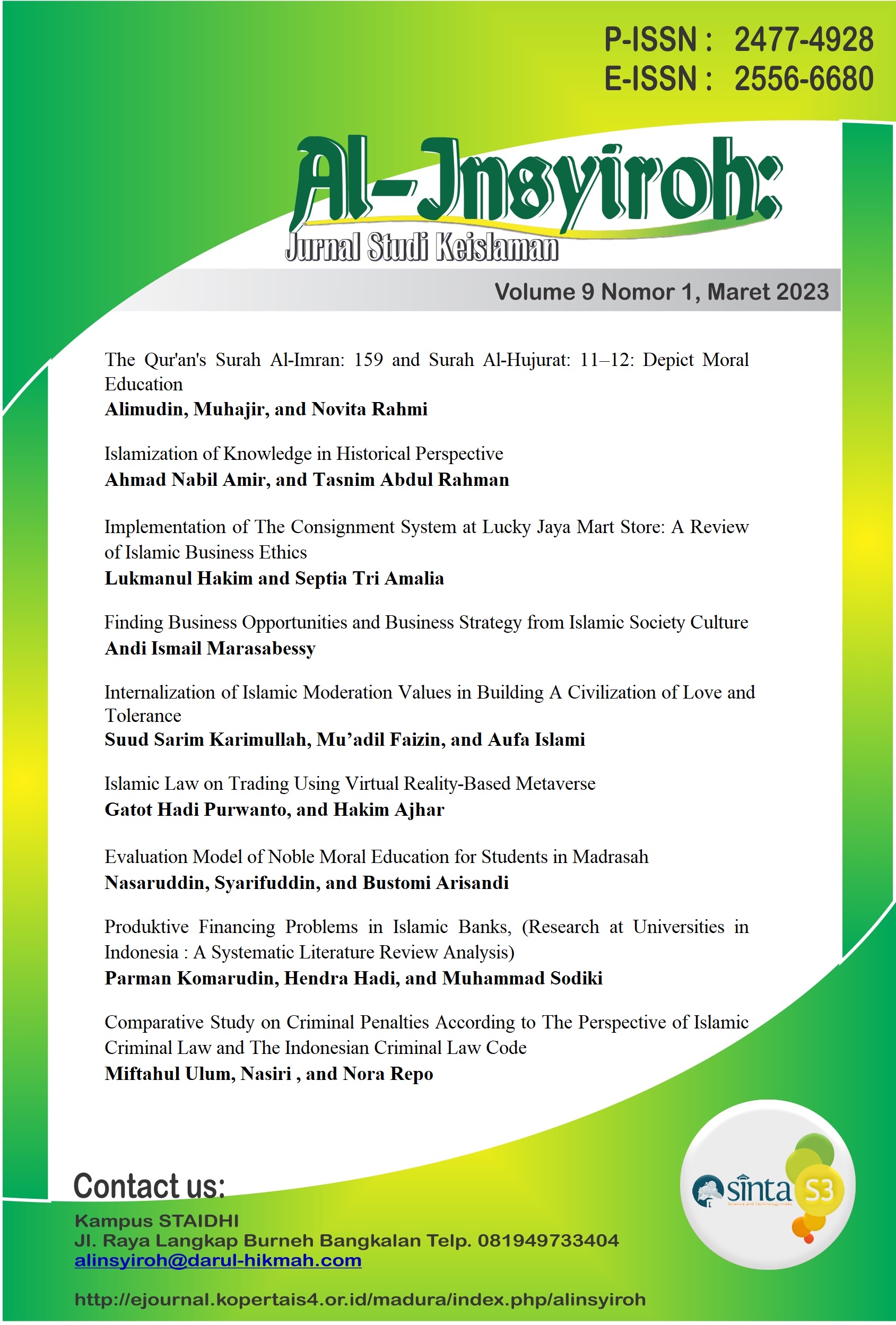The Qur'an's Surah Al-Imran 159 And Surah Al-Hujurat 11–12 Depict Moral Education
DOI:
https://doi.org/10.35309/alinsyiroh.v9i1.6258Keywords:
Moral Education, Q.S. Al-Imran: 159 and Q.S. Al-Hujurat: 11-12Abstract
This article aims to find out how the concept of moral education is in the Qur'an Surah Al-Imran verse 159 and Surah Al-hujurat verses 11-12. This research is backgrounded by the emergence of the phenomenon of moral decline that occurs among young people. One of the causes of moral deterioration is the presence of criminal activity and fights. The Qur'an is very important for mankind, especially for Muslims. Therefore, we are obliged to understand its content and content. The purpose of this study is to find out how the concept of moral education in the Qur'an surah Al-Imran verse 159 and surah Al-hujurat verses 11-12. This research is a library research using an interpretation approach. The author seeks to understand the concept of moral education by using interpretation as a supporting analytical tool, such as the books of interpretation and also the interpretations of educational figures related to moral education. Therefore, there are two main sources that are used as the basis for this study, namely primary and secondary data sources. The primary data sources here are obtained from the Qur'an, while the secondary data sources obtained use references in the form of books, articles, magazines, and so on, as well as from educational figures, whose materials are related to moral education and several topics that support this research. The results of this study show that the values of moral education contained in surah Al-Imran verse 159 and surah Al-Hujurat verses 11-12 are that humans are encouraged to always be gentle towards their relatives, sincere when giving forgiveness to others, respect the opinions or suggestions of others, abstain from attitudes and deeds of making fun of others, and abstain from prejudiced attitudes and deeds towards others, Because muslims are actually brothers.References
Ad-Dumaiji, Abdullah bin Umar. “Tawakal Adalah Sarana Terbesar Untuk Mendapatkan Kebaikan Dan Menghindari Kerusakan,†n.d. http/google.co.id/Abdullah bin Umar Ad-Dumaiji, Tawakal Adalah Sarana Terbesar Untuk Mendapatkan Kebaikan Dan Menghindari Kerusakan.
Ainusyamsi, Fadlil Yani, and Husni Husni. “Perspektif Al-Qur’an Tentang Pembebasan Manusia Melalui Pendidikan Akhlak.†Jurnal Penelitian Pendidikan Islam 9, no. 1 (2021): 51–60.
Aisah, Siti, and Mawi Khusni Albar. “Telaah Nilai-Nilai Pendidikan Sosial Dari QS Al Hujurat: 11-13 Dalam Kajian Tafsir.†Arfannur 2, no. 1 (2021): 35–46.
Al-Maraghi, Ahmad Mustafa. Tafsir Al-Maraghi, Juz XVI. Mesir: Mustafa al-Babi alHalabi, 1974.
Anshari, H.A. Hafizh. Ensiklopedi Islam. Jakarta: Ichtiar Baru van Hoeve, 2005.
Arabia, Departemen Haji dan Wakaf Saudi. Al- Qur’an Dan Terjemahnya. Madinah: Mujamma’ Khadim al-Haramain asy-Syarifain al-Malik li thiba’ al-Mushaf asy-Syarif, 1991.
Aziz, Erwati. “Prinsip-Prinsip Pendidikan Di Dalam Surat Al-’Alaq.†IAIN Sunan Kalijaga Yogyakarta, 1997.
Bisri, A., & Fatah, Munawir. A. Kamus Al-Bisri. Surabaya: Pustaka Progresif, 1999.
Doni. “Pendidikan Sosial Dalam Al-Quran Surat Al-Hujurat Ayat 11-13.†FITK UIN Syarif Hidayatullah Jakarta, n.d. http://repository.uinjkt.ac.id/dspace/handle/123456789/47866.
Fahruddin, M. Mukhlis. “Konsep Pendidikan Humanis Dalam Perspektif Al Qur’an.†UIN Sunan Kalijaga Yogyakarta, 2008.
Firmansyah, Deri. “Konsep Pendidikan Akhlak : Kajian Tafsir Surat Al Hujurat Ayat 11-13.†Al-Mutharahah: Jurnal Penelitian Dan Kajian Sosial Keagamaan 19, no. 2 (2022).
Fuadi, Ariza. “Etika Bisnis Dan Upaya Membangun Budaya Berbisnis Yang Islami.†Az-Zarqa’: Jurnal Hukum Bisnis Islam 5, no. 2 (2013).
Fuadi, Moh Ashif, and Bustomi Arisandi. "Study of The Shift in The Function from Religious Education to Rehabilitation: Pesantren Al-Jannatu DÄrul Ma'wa Condromowo Ngawi." Al-Insyiroh: Jurnal Studi Keislaman 8.2 (2022): 57-81.
Ghoni, Abdul. “Konsep Tawakal Dan Relevansinya Dengan Tujuan Pendidikan Islam: Studi Komparasi Mengenai Konsep Tawakal Menurut M. Quraish Shihab Dan Yunan Nasution.†An-Nuha: Jurnal Kajian Islam, Pendidikan, Budaya Dan Sosial 3, no. 2 (2016): 249–63.
Hakim, Lukman, and Ahmad Danu Syaputra. “Al-Qur’an Dan Pengentasan Kemiskinan.†Jurnal Ilmiah Ekonomi Islam 6, no. 3 (2020): 629–44.
Hayati Nufus, Nur Khozin, and La Diman. “Nilai Pendidikan Multicultural (Kajian Tafsir AlQur’an Surah Al Hujurat Ayat 9-13).†Prodi PAI, FITK IAIN Ambon 2, no. 2 (2018): 130–58.
Ilyas, Yunahar. Kuliah Akhlaq. Yogyakarta: LPPIUMY, 2007.
Juwariyah. Dasar-Dasar Pendidikan Anak Dalam Al-Qur’an. Jakarta: Teras, 2010.
Lutfi, Moh. “MEMBUMIKAN NILAI NILAI AKHLAQ DALAM KITAB AL-FIYAH IBNU MALIK DI PONDOK PESANTREN ROUDHLATUL MUTAALLIMIN AL AZIZIYAH II SEBANEH BANCARAN BANGKALAN.†Attaqwa: Jurnal Ilmu Pendidikan Islam 17, no. 2 (2021): 164–81.
Malik, Imam. Pengantar Psikologi Umum. Yogyakarta: Teras, 2011.
Mufaizin, Mufaizin Mufaizin. "STUDI HADITS (Pengantar Teoritis Memahami Hadits & Ilmu Hadits)."
Munawwir, Ahmad Warson. Kamus Al-Munawwir Kamus Arab-Indonesia. Surabaya: Pustaka Progressif, 1997.
Prasetyo, Hanif. “Studi Komparatif Pemikiran Pendidikan Akhlak Imam Al-Ghazali Dan Haji Abdul Malik Karim Amrullah.†Universitas Islam Negeri Maulana Malik Ibrahim, 2012.
Qardawi, Yusuf. Halal Haram Dalam Islam. Jakarta, 2004.
Qiptiyah, Titin Mariatul. “Pendidikan Akhlak Pada Anak “Perspektif Al-Qur’an Dan Hadist".†Childhood Education: Jurnal Pendidikan Anak Usia Dini 2, no. 20020 (1AD): 108–20.
Qomar, Mujamil. Fajar Baru Islam Indonesia?: Kajian Komprehensip Atas Arah Sejarah Dan Dinamika Intelektual Islam Nusantara. Bandung: Mizan, 2012.
Rusdiyanto, Rusdiyanto, Indah Werdiningsih, and Mufaizin Mufaizin. "Islamic Moderation in Salaf based Education at the ad-Dimyati Lalang Islamic Boarding School, Wonojati, Jenggawah, Jember Regency." Al-Insyiroh: Jurnal Studi Keislaman 8.1 (2022): 168-186.
Sastraprtedja, M. Pendidikan Nilai Memasuki Tahun 2000. Jakarta: Gramedia, 1993.
Shihab, M. Quraish. Tafsir Al-Mishbah: Pesan, Kesan Dan Keserasian Al-Qur’an, Vol. 5. jakarta: Lentera Hati, 2002.
Suryadilaga, M. Alfatih. Ulumul Hadits. Yogyakarta: Teras, 2010.
Syaikh Safiyyaturrahman Al-Mubarakfuri. Shahih Tafsir Ibnu Katsir. Bogor: Pustaka Ibnu Katsir, 2016.
Syauqii, Fachri. “Penerapan Pembelajaran Akhlak Terhadap Keluarga Dan Lingkungan Tempat Tinggal.†Islam & Contemporary 2, no. 1 (2022): 32–36.
Thalib, Muh Dahlan. “Takdir Dan Sunnatullah (Suatu Kajian Tafsir Maudhu’i).†AL-ISHLAH: Jurnal Pendidikan Islam 13, no. 1 (2015): 28–38.
Wahyudin, Didin. “Konsep Pendidikan Akhlak Dalam Al-Qur’an Surat Ali Imran Ayat 159, Luqman Ayat 17-18 Dan Al-Hujurat Ayat 11,†2014. http://repo.uinsatu.ac.id/id/eprint/45.
Downloads
Published
How to Cite
Issue
Section
License
Copyright (c) 2023 Al-Insyiroh: Jurnal Studi Keislaman

This work is licensed under a Creative Commons Attribution-ShareAlike 4.0 International License.

This work is licensed under a Creative Commons Attribution-ShareAlike 4.0 International License.









